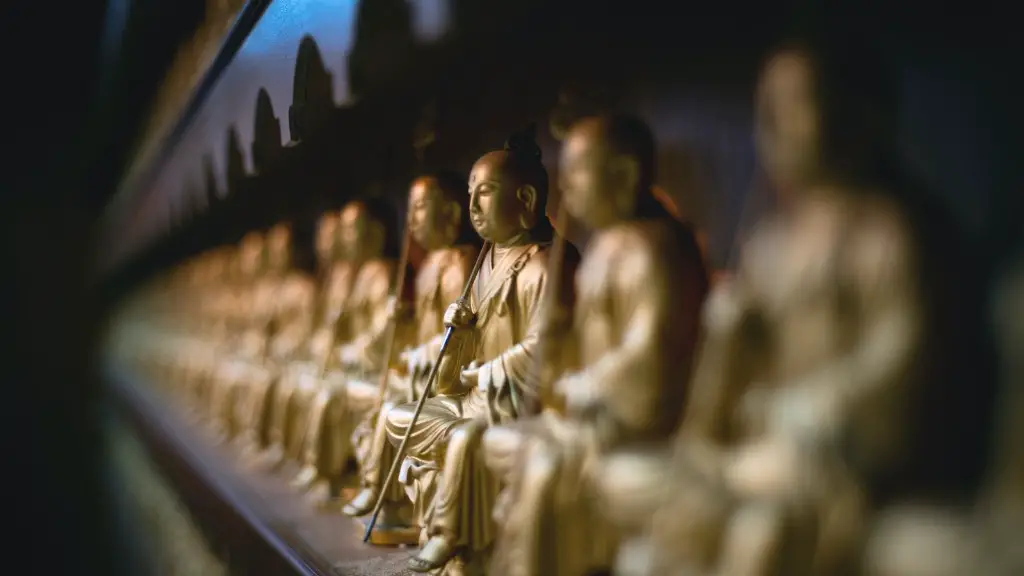The law of karma is an ancient, independently evolved, deep-seated concept within Hinduism. It is a law that states that one’s actions can have a positive or negative effect on oneself and others, with the repercussions of these actions being experienced in the present life or carried over into the future, depending on the nature of the action. In Hinduism, karma is seen as part of the natural order of the universe, as well as part of the cosmic justice system. It helps to explain why individuals amass different levels of suffering and misfortunes, according to the particular type of life experience they have earned through their past actions.
The concept of karma has existed for thousands of years. When the ancient Vedas were written, the concept of karma was used to explain both the misery and suffering of people, as well as their successes and good fortune. It was believed that the consequences of an act, be it good or bad, could be revisited upon an individual in the present or in a future life. This laid the foundation for the ethical and moral teachings of Hinduism. The Vedas stated that the individual soul is an embodiment of the divine and its actions are responsible for the conditions it is subjected to in its current manifestation.
In Hinduism, the concept of karma is seen as a way to achieve moksha, or enlightenment, by doing good deeds throughout one’s life. By enabling individuals to take responsibility for their past and present actions, it allows them to choose the kind of life they desire and the goals they want to achieve. It is believed that karma dictates not only earthly conditions but also the conditions in the afterlife. Hindus are encouraged to work towards earning good karma, as it is thought to help them break the cycle of reincarnation and reach moksha, or spiritual liberation.
The practice of Dharma, or righteous living, is central to understanding karma, as it involves the achievement of spiritual liberation through selfless actions. Hinduism teaches that the individual must live in accordance with Dharma and that the law of karma is the cosmic law that governs all actions in the universe, including those of the divine. In this sense, karma is seen as the natural result of any action, regardless of whether it is religious or profane.
The idea of karma is also used to explain why certain people may be born poorer than others or why certain people are subjected to suffering or injustice. It is also used to explain why certain prophecies may seem to come true. Hinduism believes that these occurrences occur to them as a result of their activities in past lives and that, due to the law of karma, individuals will reap what they have sown.
Karma is seen as a key factor in the accumulation of suffering and spiritual liberation. By understanding and adhering to the law of karma, individuals can strive to create a better future for themselves and others, by producing positive outcomes from their actions. As such, it can be seen as an effective way to gain control over the experiences of life and the rewards of spiritual enlightenment.
Lessons From karma
The law of karma offers valuable lessons in terms of how individuals can live their lives and act in a morally responsible way. Hinduism teaches that all actions have an effect, and that by adhering to Dharma, individuals can create positive karma and reduce negative karma. This encourages individuals to reflect upon their actions and strive to act in accordance with their conscience, leading to the improvement of their spiritual state.
Additionally, understanding the law of karma helps individuals to take responsibility for their own actions. By being aware of the potential consequences of their choices, individuals can make more mindful decisions and strive to manifest a better future for themselves. Thus, karma encourages individuals to form a self-reliant approach to life and to work to create a better future for themselves and others.
Karma And Indian Philosophy
In Indian philosophical traditions, karma is seen to be closely linked to the idea of reincarnation. It is believed that the individual soul can be reborn in different forms, depending on their actions in their current life and previous lives. This is known as samsara, the cycle of resurrection and rebirth.
In this view, karma is seen to determine not only the course of one’s life in the present, but also the course of future lives. Individuals are encouraged to strive to accumulate good karma through living a moral and ethical life and to break the cycle of samsara, allowing them to attain spiritual liberation.
Karma is also seen to be connected to the various forms of asceticism, or renunciation, practiced in Hinduism. The idea behind this is that by striving to achieve a state of detachment and stillness, individuals can transcend the physical and mental limitations of the world. This allows them to break the cycle of samsara and escape from the laws of karma.
Rebalancing The Laws Of Karma
One of the main tenets of Hinduism is the idea of cosmic balance or Dharma. This is a balance between the forces of good and evil, which is maintained through the forces of karma. Thus, it is believed that individuals should strive to create a balance between the different aspects of their lives in order to make progress on the path of spiritual liberation.
The concept of karma also teaches individuals to be aware of their own thoughts and actions, and how these can have a positive or negative impact on their destiny. To accomplish this, individuals are encouraged to cultivate virtues such as humility, serenity, and wisdom and to avoid negative traits such as anger, pride, and greed.
Finally, Hinduism believes that by understanding the law of karma and striving to accumulate positive karma, individuals can create a better future for themselves and those around them. This is due to the fact that, through their actions and decisions, individuals can create a virtuous cycle that will lead to the manifestation of their ultimate goal, which is spiritual liberation.
The Spiritual Benefits Of Good Karma
The Hindu tradition lays great emphasis on the importance of accumulating good karma and following the path of Dharma. It is believed that this will lead to a better life in the present and in the afterlife, as well as increased spiritual development. By accumulating good karma, individuals can break the cycle of samsara and escape from the laws of karma, which will allow them to attain the state of moksha, or liberation, from the cycle of life and death.
Moreover, by striving to create a positive energy field through their actions, individuals can create a better environment for themselves and others, inspiring them with hope and courage and enabling them to reach their spiritual goals. In this sense, the law of karma is seen as a way to create a more compassionate, harmonious world and to foster spiritual growth.
The Teachings Of Karma
The law of Karma teaches that all individuals are ultimately responsible for their own actions and that they will reap what they have sown. This encourages individuals to act with a greater level of mindfulness, being aware of the potential consequences of all their actions. Additionally, it helps to create a sense of cosmic order and justice, encouraging individuals to strive for a balance between good and evil and to live in accordance with the divine will.
Karma reinforces the idea that individuals should strive to live ethically and morally, as their actions will have an effect on the future and on their spiritual journey. It also teaches individuals to take responsibility for their own destiny, by striving to create a better future through positive actions. In this way, it can be seen as an effective way to gain control over the experiences of life and the rewards of spiritual enlightenment.
The Role Of Spirituality In Understanding Karma
For Hindus, understanding the law of karma is a key part of spiritual development. Through this understanding, individuals can become aware of the potential consequences of their actions and strive for reincarnation, or moksha, by freeing themselves from the laws of karma. Additionally, it helps individuals to take control over their destiny and to live life in accordance with Dharma, or ethical living.
Ultimately, by adhering to the law of karma and understanding its teachings, individuals can create a better future for themselves and those around them. This is due to the fact that, through their actions and decisions, individuals can create a virtuous cycle that will lead to the manifestation of their ultimate goal, which is spiritual emancipation.
The Role Of Karma In The Universe
Karma is seen as one of the fundamental laws of the universe, as it helps to explain why individuals amass different levels of suffering and misfortunes. It also helps to create a sense of cosmic justice, by enabling individuals to be held accountable for their actions. Additionally, karma is seen as a key factor in the accumulation of suffering and spiritual liberation, as it encourages individuals to take responsibility for their own actions and to strive for a better future.
In Hinduism, the law of karma is seen as an integral part of Dharma and as a way to achieve enlightenment by doing good deeds throughout one’s life. It is seen as a way to redeem oneself from the cycle of samsara and to find a way to moksha, or spiritual liberation. Additionally, understanding the law of karma makes individuals more mindful of their own thoughts and actions and how these can have a positive or negative impact on their destiny.



